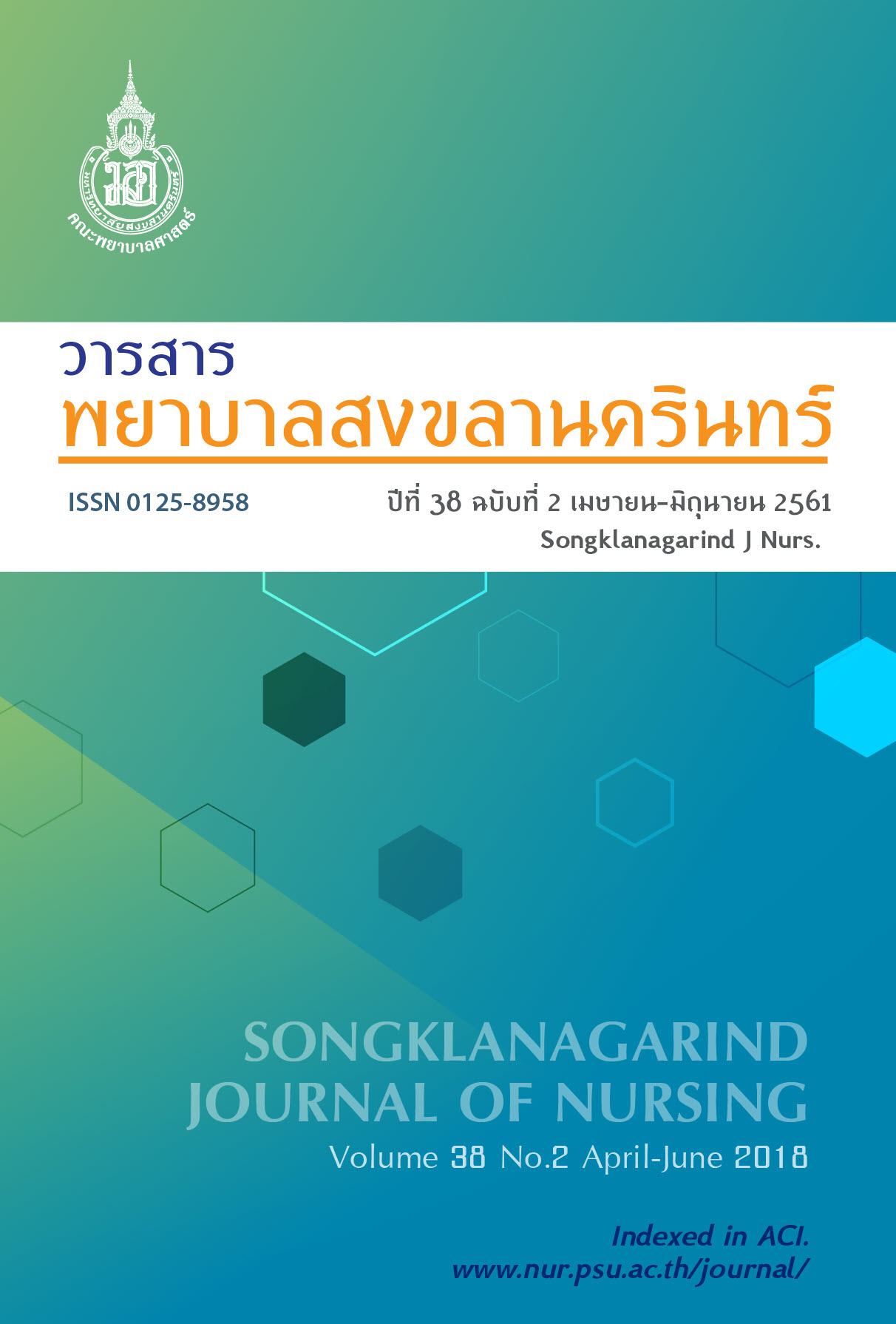The Effects of the Project Based-Learning on Reflection Thinking’s Behaviors of Nursing Students The Effects of the Project Based-Learning
Main Article Content
Abstract
This quasi-experimental research aimed to compare reflective thinking’s behaviors of nursing students before and after teaching method using the project based-learning. The samples were 139 nursing students in the 2nd year, academic year 2017 of Boromarajonani College of Nursing, Buddhachinaraj, registered for ethics and laws for nursing profession course. The tools used in the study included the project based-learning lesson plans created from Kalyanamits for Buddhist Networks11; and tools to collect data: a demographic data form and reflective thinking’s behavior questionnaire translated and developed by the researchers from Kember ,etal.6, consisted of 16 items. The data were analyzed by frequency, percentage, mean, standard deviation, and
Dependent T-test. The results of the study showed that after they were taught by using the project basedlearning, the samples had a statistically significant higher overall reflective thinking’s behavior scores than those before taught (p< .001). Considering in each dimension, the results showed that each dimension had a statistically significant higher reflective thinking’s behavior scores than those before taught: from high to low scores as follows: understanding, reflection, critical reflection, and habitual action, respectively (p<.001).
Article Details
References
2. Ruengrong P, Jiravarawong B, Manyum W, et al. Education technology vs Thai teachers in 21st century. Panyawat J. 2014; 5(Suppl.): 195-207. Thai.
3. Schon AD. The reflective practitioner. Aldershot: Ashgate Publishing Ltd; 1991.
4. Wichainate K. Reflective thinking: Teaching students to develop critical thinking in nursing practice. Journal of The Police Nurse. 2014; 6(2), 187- 99. Thai.
5. Gibbs G. Learning by doing: A guide to teaching learning methods. Oxford: Oxford Brookes University. 1988.
6. Kember D, Leung D, Jones A, et al. Development of questionnaire to measure the level of reflective thinking. Assess Eval High Educ. 2012; 25(4): 380-95. doi: 10.1080/713611442
7. Klunklin P, Thaiyapirom N, Woragidppoonpol P. Learning experiences through reflective thinking diaries on practice of child health promotion among nursing students. J. Nurs. Educ. 2008; 1(2): 1-4. Thai.
8. Kaewprom C, Boontum A, Pratoom L, et al. Perceptions of nurse students towards reflective journal. J. Nurs. Educ. 2014; 7(3): 101-112. Thai.
9. Pianpeng T, Koraneekij P. Effect of reflection using video based on Gibbs’ cycle in the electronic portfolio on the level of reflective thinking of teacher students. International Journal of Social Science and Humanity. 2014; 9(14): 150-63.
10. Prompasit P. Develop knowledge cycle through problem-based learning and project based learning. 2014 [cited 2018 Mar 8] Available fromhttps://huso.kpru.ac.th/File/Academic/KM%20 BOOK-57.pdf. Thai.
11. Kalyanamits for Buddhist Networks. Moral project guideline: Thai youth does good things for the King. Bangkok: Kalyanamits for Buddhist Networks; 2013. Thai.
12. Gong R. The influence of project-based learning on nursing students’ core competencies: A case study in China [Dissertation], Department of Education, University of Jyväskylä. 2017 [cited 2018 Mar 8]. Available from: from https://jyx. jyu.fi/dspace/bitstream/handle/123456789/ 54623/URN:NBN:fi:jyu-201706212998.pdf? sequence=1
13. Bell S. Project-based learning for the 21st century: Skills for the future. Clearing House 2010; 83: 39–43.
14. Dewey J. Democracy and education. New York: Free Press. 1916 [cited 2018 Mar 8]. Available from: https://archive.org/details/democracyeducati 1916dewe.
15. Rodger C. Defining reflection: Another look at John Dewey and reflective thinking. Teacher College Record. 2002; 104(4): 842-66.
16. Habók A, Nagy J. In-service teachers’ perceptions of project-based learning. SpringerPlus. 2016; 5: 83. [cited 2018 Mar 8]. Available from https://doi. org/10.1186/s40064-016-1725-4
17. Markham T. Project based learning a bridge just far enough. Teacher librarian 2011; 39(2): 38-42.
18. Kaya H, Senyuva E, Isik B, et al. Nursing students’ opinions regarding project based learning. Procedia Soc Behav Sci. 2014; 152: 379-85. doi: 10.1016/j.sbspro.2014.09.216
19. Peixoto N, Peixoto T. Reflective practice among nursing students in clinical teaching. J NursingReferência 2014; 4(11): 121-31. doi: 10.12707/ RIV16030
20. Kanhadilok S, Punsumreung T, Pookpan S. The integrated clinical teaching methods on reflective thinking, and clinical judgment in 3rd year nursing students in maternal infant and midwife nursing practicum course I. HCU Journal of Health Science. 2017; 20(40): 87-99. Thai.


